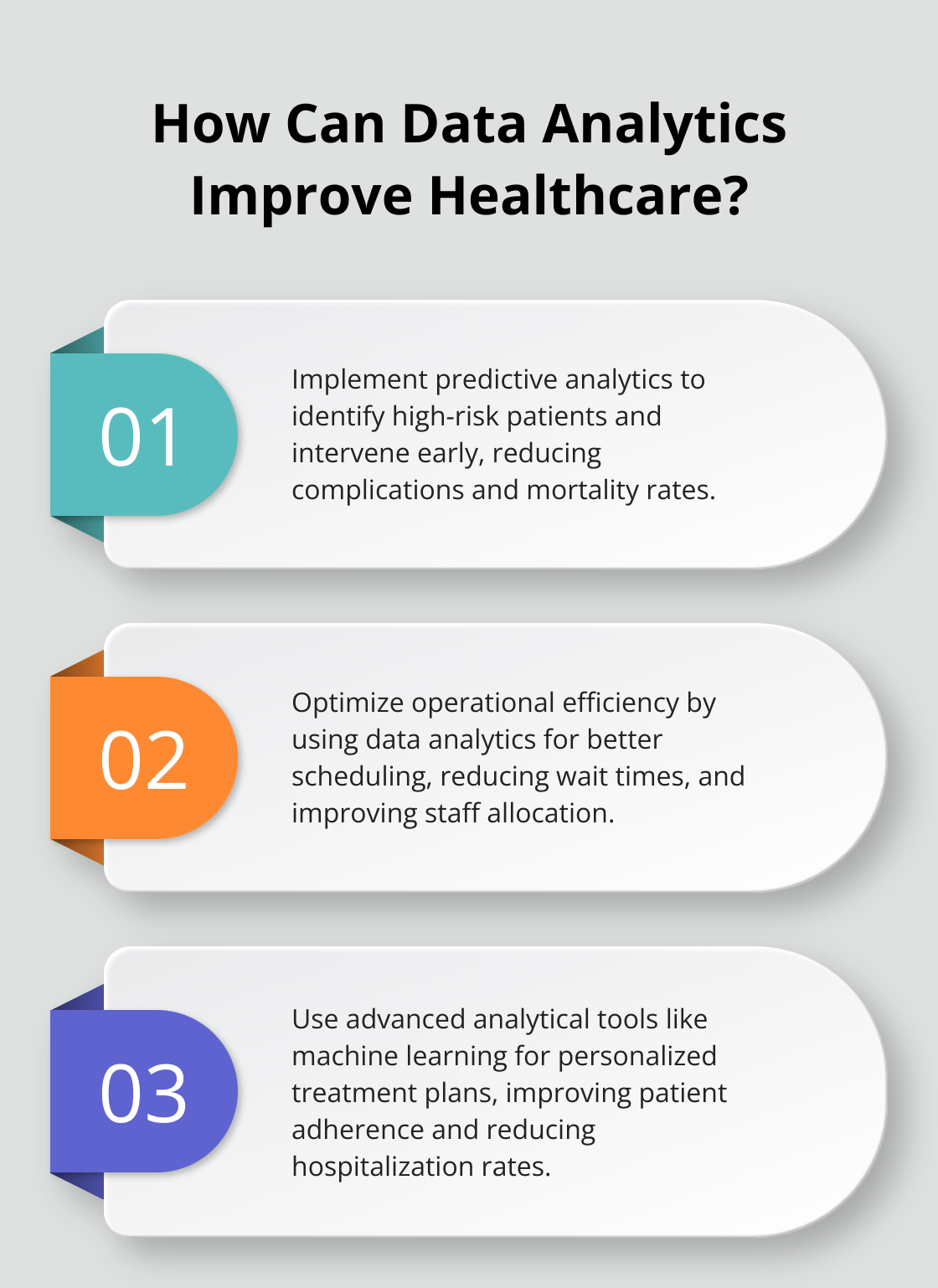
Healthcare Data Analytics: [Pro Tips]
Data analytics is revolutionizing healthcare, offering significant improvements in patient outcomes and operational efficiencies.
Here at Shirikihub, we believe in the power of data to drive preventive care and enhance overall healthcare delivery.
In this blog post, we explore practical tips for effectively using healthcare data analytics and highlight successful case studies.
How Can Data Analytics Improve Healthcare?
Data analytics is reshaping the healthcare sector in concrete and tangible ways.
Boosting Patient Outcomes
Data analytics offers actionable insights that can directly improve patient outcomes. Hospitals using predictive analytics can reduce patient readmissions by up to 30%. By analyzing patient data, healthcare providers can foresee complications and intervene early. For example, predictive models can identify patients at risk of sepsis, leading to timely treatments that save lives. This approach isn’t theoretical—it’s backed by real-world data showing significant reductions in mortality rates.
Operational Efficiency
Operational efficiency in healthcare is another area where data analytics shines. Analytics can optimize scheduling, reduce emergency room wait times, and streamline supply chain management. According to a McKinsey report, hospitals can save roughly 10-15% in operational costs through effective use of data analytics. Implementing analytics in workforce management can balance staff workloads, resulting in reduced burnout and improved patient care.
Enhancing Preventive Care
Preventive care is becoming more proactive thanks to data analytics. With tools such as predictive analytics and machine learning, healthcare providers can identify high-risk patients and recommend preventive measures before issues escalate. For instance, analytics can monitor chronic diseases better, predicting flare-ups and allowing for timely interventions. This not only improves patient health but also lowers healthcare costs. The use of connected healthcare devices can further this goal, as detailed here.
Data analytics is not just about improving the present; it’s about building a sustainable future. Practical application of these insights offers tangible results, both in enhancing patient care and in optimizing healthcare operations.

How to Use Data Analytics Effectively
Prioritize Data Quality
Effective healthcare data analytics starts with high-quality data. Data accuracy and consistency are paramount. According to the American Health Information Management Association, inaccurate or incomplete data can lead to costly errors, including improper treatments. Therefore, it is essential to implement rigorous data validation processes and maintain up-to-date data entries.
Utilize Advanced Analytical Tools
Harnessing the power of advanced analytical tools can significantly enhance healthcare outcomes. Tools like machine learning and AI can process vast amounts of data rapidly and predict patient outcomes more accurately. For instance, using machine learning algorithms, healthcare providers can identify patterns and predict patient admissions, easing resource allocation and staffing requirements. Tableau, recognized as a top analytics provider, offers robust data visualization tools that make it easier to interpret and act on complex data sets.
Nurture a Data-Driven Culture
Fostering a data-driven culture within healthcare organizations is essential for the successful adoption of data analytics. Continuous training and development programs help staff understand the power of data and how to use it effectively. Encouraging collaboration across departments ensures that insights gleaned from data analytics are implemented in everyday clinical and operational practices. Institutions that embrace a data-centric mindset report lower operational costs and improved patient care metrics.

Implementing these strategies can lead to substantial improvements in healthcare delivery. Accurate data, cutting-edge tools, and a collaborative culture are the keystones of successful data analytics in healthcare. For more insights on enhancing healthcare delivery through data, see additional tips on connected healthcare devices.
Effective Healthcare Data Analytics Examples
Predictive Analytics at Mayo Clinic
Mayo Clinic has been at the forefront of utilizing predictive analytics to enhance patient care. By leveraging vast datasets, Mayo Clinic’s analytics team created predictive models that identify patients at risk of severe complications, such as sepsis or cardiac events. These models enable early interventions, leading to a 25% decrease in emergency situations. The clinic attributes its success to integrating real-time analytics into their electronic health records (EHR) system. Implementing similar predictive models can help other healthcare institutions proactively manage patient health and reduce critical incidents.
Big Data for Operational Efficiency at Kaiser Permanente
Kaiser Permanente’s adoption of big data analytics has significantly optimized their operational efficiency. By analyzing data from various touchpoints, including patient care and supply chains, Kaiser Permanente has reduced operational costs by 12%. One notable success is in staff allocation. Using data analytics, they crafted a scheduling system that aligns staffing levels with patient influx patterns, minimizing wait times and improving patient satisfaction. For healthcare organizations aiming to streamline operations, adopting big data solutions can lead to better resource management and cost savings.
Disease Management Insights by UnitedHealthcare
UnitedHealthcare effectively employs health data insights to improve disease management. Through comprehensive analysis of patient data, they have developed personalized treatment plans for chronic diseases like diabetes and hypertension. The use of advanced analytics has resulted in a 20% improvement in patient adherence to treatment plans. Also, by identifying high-risk patients early, they have reduced hospitalization rates by 15%. This case underscores the importance of using robust data analytics for personalized and preventative care strategies. For more on enhancing healthcare delivery through data, see tips on connected healthcare devices.

By looking at these successful implementations, it is clear that effective use of healthcare data analytics not only improves patient care but also optimizes healthcare operations. Institutions looking to leverage data analytics should focus on building robust predictive models, utilizing big data for operational efficiencies, and developing personalized patient care strategies.
Conclusion
Data analytics is transforming healthcare by improving patient outcomes, enhancing operational efficiencies, and advancing preventive care. Real-world examples from leading institutions like Mayo Clinic and Kaiser Permanente underscore the substantial benefits of predictive analytics and big data solutions. Mayo Clinic, for instance, has achieved a 25% drop in emergency incidents by integrating predictive models into their EHR system. Similarly, Kaiser Permanente’s analytics-driven approach has reduced operational costs by 12% and minimized patient wait times through optimized staffing.

For effective use of healthcare data analytics, prioritizing data quality is essential. Ensuring data accuracy and consistency can prevent costly errors. Advanced analytical tools, such as machine learning and AI, facilitate rapid and precise data processing, aiding in resource allocation and patient care. Tools like those provided by Tableau empower healthcare providers to visualize and act on complex data with ease.
Nurturing a data-driven culture within healthcare institutions fosters better adoption and implementation of analytics. Continuous training and collaboration across departments enable organizations to fully leverage the insights provided by data analytics, leading to lower operational costs and improved patient care metrics.
Encouraging the adoption of data analytics in healthcare can lead to significant improvements in care delivery and operational efficiency. Join us in pioneering this transformation and enhance your organization’s tech infrastructure with robust solutions. For further insights on digital enhancements in healthcare, check this guide out.
Transform your business with Shirikihub’s innovative solutions. Explore our smart WiFi management system and AI-driven distributed cloud storage. Reduce costs, enhance accessibility, and join the future of sustainable, scalable digital infrastructure. Learn more at ARED.


